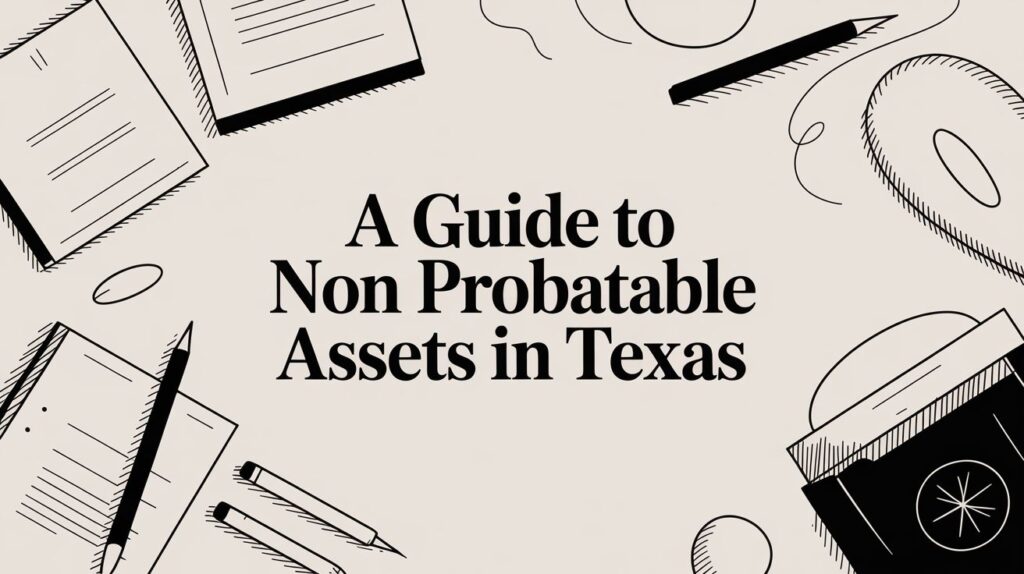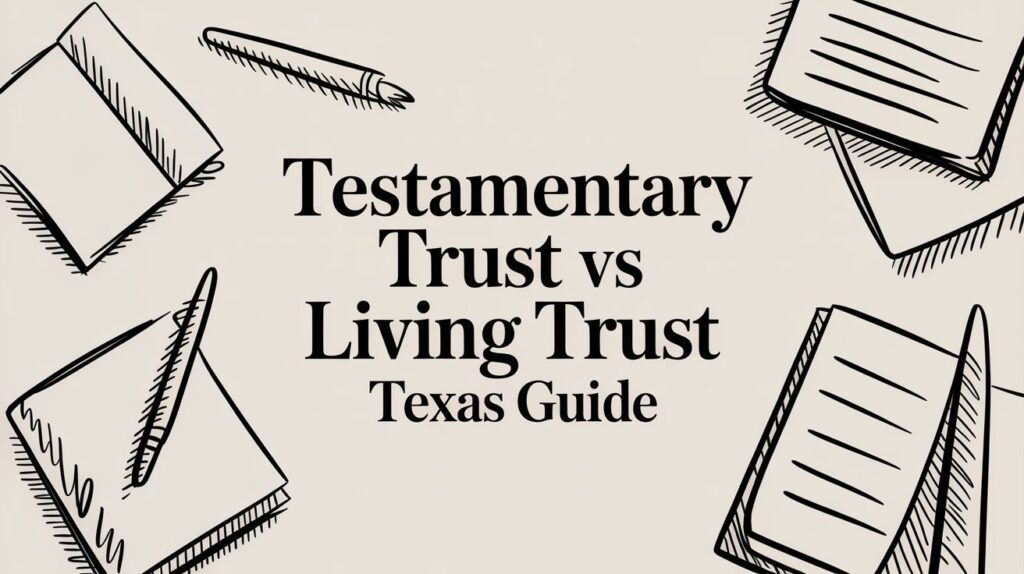If you’re wondering how much it truly costs to probate an estate in the Lone Star State, you’re not alone. Many families find themselves facing this question after the passing of a loved one, often unprepared for the expenses and steps that follow. The phrase administering probate estate costs Texas might sound like legal jargon, but understanding what it entails is critical if you want to protect your loved ones, your assets, and your financial legacy.
This comprehensive guide is designed to walk you through the real costs of administering a probate estate in Texas. We’ll also show you how smart estate planning now can save your family thousands of dollars and months—or even years—of court delays later. Through stories, real figures, and plain-English advice, we’ll help you grasp the numbers behind the paperwork and empower you with tools to minimize future probate headaches.
.png)
What Is Probate and Why Does It Cost So Much?
Probate is the legal process through which a deceased person’s estate is administered and distributed. In Texas, this process involves validating the will (if one exists), appointing an executor or administrator, notifying creditors, paying debts, and ultimately distributing assets to heirs. It acts as the court’s way of ensuring that everything is done fairly, lawfully, and according to the decedent’s final wishes.
So why is administering probate estate costs Texas such a big concern? Because probate isn’t free—and the costs go far beyond filing fees. Probate can include:
- Court fees
- Attorney’s fees
- Executor compensation
- Appraisal costs
- Bond fees (if not waived)
- Accounting and tax filing fees
- Publication costs for public notices
Each of these adds up. And while Texas is often praised for having a more streamlined probate system than other states, that doesn’t mean it’s cheap. For many families, especially those without liquid assets available upfront, these expenses can quickly become a source of stress and financial strain.
Real-Life Story: Margaret’s Surprise Bill
Margaret, a 63-year-old retiree in Houston, was named executor of her sister’s estate. She assumed it would be a simple matter—file the will, pay a few bills, and move on. But within three months, she’d paid nearly $6,000 in court costs, attorney’s fees, and property appraisals. Her sister’s estate wasn’t particularly complicated, but because there had been no advance planning, the process dragged—and the expenses piled up.
Margaret’s experience shows how failing to plan can turn even modest estates into costly affairs. Knowing what you’re getting into—and how to plan for it—can make all the difference.
Breaking Down Administering Probate Estate Costs Texas
To better understand what you or your family might face, let’s break down the typical probate expenses in Texas.
1. Court Filing Fees
Every probate case starts with filing documents in county court. Filing fees vary by county but typically range from $250 to $400. This includes filing the application to probate a will and request Letters Testamentary or Administration.
2. Attorney’s Fees
While Texas doesn’t mandate hiring a probate attorney for independent administration, most courts strongly encourage or require it for all but the simplest cases. Legal fees range based on the complexity of the estate but often start at $2,500 to $5,000 for straightforward estates.
More complex estates or contested matters (like will disputes or creditor claims) can easily push attorney’s fees above $10,000.
3. Executor or Administrator Fees
Texas law allows executors to be paid a statutory fee of 5% of all amounts received or paid out by the estate. On a $500,000 estate, this could mean $25,000 in compensation. However, many wills waive executor compensation, especially if the executor is a family member.
4. Appraisal and Valuation Costs
Property and asset valuations are often needed to calculate estate taxes or for distribution. Hiring appraisers can cost $300 to $1,000+, especially for real estate, antiques, or business assets.
5. Bond Premiums
If the will doesn’t waive the bond requirement, the executor may be required to purchase a surety bond to protect the estate. Bond premiums can cost from $500 to several thousand dollars depending on the estate’s value and the executor’s credit history.

6. Publication and Notice Fees
Texas law requires executors to publish notices to creditors in a local newspaper. These ads typically cost $100 to $300.
7. Tax Preparation and Accounting
Even modest estates may require the preparation of a final income tax return, estate tax filings, or handling unpaid property taxes. CPA or tax attorney fees can range from $250 to over $2,000, depending on complexity.
Add all of this together, and it’s easy to see how administering probate estate costs Texas can become a substantial burden—especially if the estate has no liquidity to cover the expenses upfront.
The Time Factor: Time Is Money in Probate
On top of the dollars-and-cents costs, probate in Texas typically takes between 6 months and 1.5 years—sometimes longer for contested estates or those with hard-to-value property.
Every delay increases administrative costs. Property taxes continue to accrue. Attorneys bill for additional hours. Executors lose time—and potentially income—managing an estate they weren’t expecting to oversee for so long.
Speed matters. And the best way to speed up probate is by reducing how much of the estate goes through it in the first place.

How to Minimize Probate Estate Costs Through Smart Planning
Let’s shift gears and talk strategy. If you’re still alive and well (and we hope you are), there’s a lot you can do right now to reduce or eliminate administering probate estate costs Texas for your loved ones in the future.
1. Create a Will—And Make It Clear
A clear, properly drafted will is the foundation of any good estate plan. Make sure it:
- Names an independent executor
- Waives bond
- Clearly distributes assets
- Is signed with the required formalities
Ambiguous wills often lead to disputes—and litigation is one of the biggest cost drivers in probate.
2. Use Beneficiary Designations
Assets like life insurance, retirement accounts, and even bank accounts can be transferred directly to beneficiaries outside probate. Make sure these forms are up to date and align with your will.
3. Consider a Revocable Living Trust
Trusts can bypass probate entirely for most assets. While there’s some upfront cost to create one (typically $1,500 to $3,000), it can save thousands in probate expenses down the line.
A properly funded trust allows for immediate asset transfer after death, often avoiding the court system altogether.
4. Use Payable-on-Death (POD) and Transfer-on-Death (TOD) Accounts
These designations let you name beneficiaries who automatically receive your assets upon your death without probate involvement.
This is especially helpful for checking, savings, and brokerage accounts.
5. Transfer Real Estate Outside Probate
Texas allows you to file a Transfer-on-Death Deed, which lets your home pass directly to a named beneficiary after death—no court required.
This low-cost step can prevent thousands in probate-relatedreal estate delays.
6. Keep Detailed Records and Communicate
Even the best-laid plans can fall apart if your heirs can’t find your documents. Keep your estate plan organized and tell your executor where to find it.
Clear instructions help prevent confusion, delays, and the cost of hiring professionals to sort things out.
Real-Life Story: Thomas Saves His Family Thousands
Thomas, a 58-year-old business owner in San Antonio, spent an afternoon with an estate planning attorney and set up a trust, designated POD accounts, and filed a transfer-on-death deed for his home.
When he passed five years later, his children were able to settle his affairs in just 90 days—with legal costs under $1,000. Because most of his assets passed outside of probate, there was no need for costly court filings or drawn-out proceedings.
His proactive planning made what could have been an expensive, emotional process into a smooth transition.
What If You’ve Already Started Probate? Tips to Reduce Ongoing Costs
Even if you’re already in the middle of a probate case, there are still ways to reduce the financial impact.
- Request a waiver of bond if the will doesn’t address it
- Communicate clearly with beneficiaries to avoid conflicts
- Handle simple tasks yourself (like gathering records) to reduce attorney fees
- Ask the court for limited administration if the estate is small or only needs title transfer
- Sell s quickly to avoid tax penalties and carrying costs

Being efficient, organized, and proactive during the process can shave thousands off your final costs.
Final Thoughts: Administering Probate Estate Costs Texas
So, how much does it really cost to administer a probate estate in Texas? The answer depends on the size of the estate, the complexity of the assets, whether there’s a will, and how much planning was—or wasn’t—done ahead of time. But one thing is certain: administering probate estate costs Texas is a burden most families would rather avoid if they can.
The good news? With the right strategy, you can take control. Whether you’re planning your estate or helping a loved one through probate, being informed and proactive will save you time, money, and stress. And when the time comes, your family will thank you for it.








